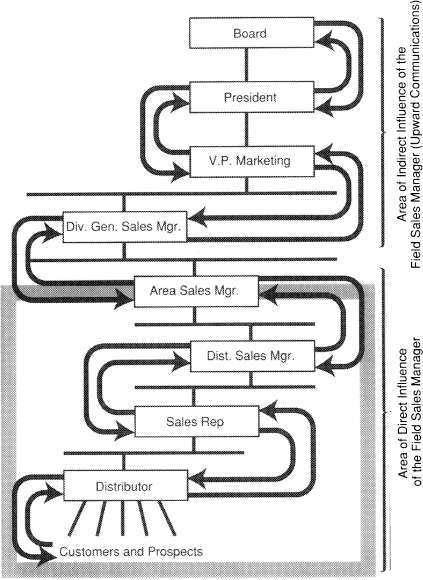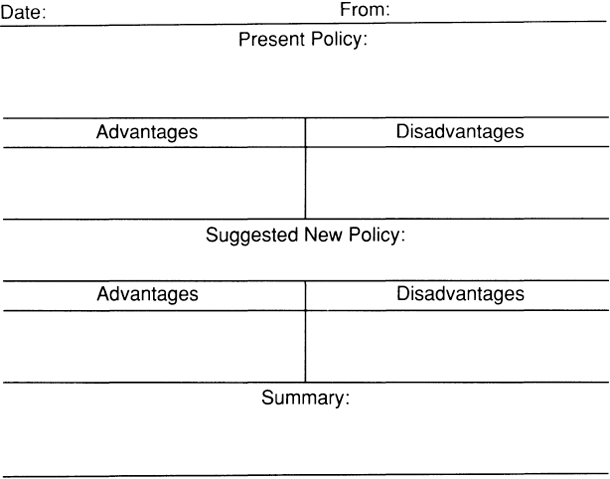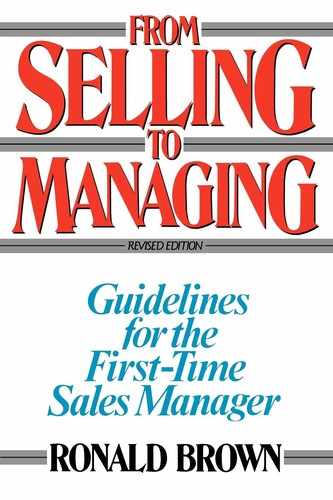6
Effective
Communications
One vital function of the field manager as a developer of salespeople is communications. As shown in Figure 6-1, managers wield influence through their communications upward all the way to the board of directors. Top management cannot function effectively without knowing what is happening in the marketplace. Field sales managers are the people who can best communicate this vital information to the top officers. They also have considerable influence over the entire marketing organization beginning with their own bosses and continuing all the way down to the customers. Communicating downward though their sales reps, they supply to them and their customers the vital information that is the very foundation of the entire marketing operation. Let’s examine what sorts of data pass through this vital communications center, the field sales manager.
Downward Communications
Assume that the president of the company has sold the board of directors on the idea of building a very large plant to manufacture product line B. Finally, the plant is ready to start operations. The board turns to the president and, in effect, says: “You wanted this plant. Now that you have it, keep it operating at full production and make it pay.” The president instructs the marketing vice president to get on the ball, and this directive seeps down. The job of selling the production of this plant is spread throughout the organization. Eventually, as field sales manager, you are told of the “piece of the pie” that you are required to take and that you in turn divide among your salespeople. Coming as it does from the very top, this message urgently requires the very best of communications. All sales reps are given to understand that, while they are expected to maintain their sales of product lines A, C, D, and E, they must reach their quotas on product line B. You are the one who must help them develop the skills that will enable them to do this. The real job of selling the output of the new mill is done by the sales reps, and you as the field sales manager assume the key responsibility for getting the job done.
Figure 6–1. The field sales manager’s communications network.

Similarly, you must transmit and gain acceptance of the objectives that each sales rep must achieve during the current period and that concern the sales rep’s personal development; you must communicate and gain acceptance for company policies and procedures; transmit valuable product or market information to the sales reps; and do all these things in a manner that will hold the sales reps’ attention.
The most effective communication is accomplished on a face-to-face basis. Instruction, criticism, and coaching are most effective when performed by the manager in the field with the salesperson. The telephone is a valuable medium for exchanging data, but it is primarily informational and not recommended for instruction, much less criticism. Mail communications may be used to advantage in a number of ways. A letter can be used effectively to commend a sales rep, to confirm a personal conversation or phone call, to reduce to writing some specific directions, to prepare for some action to be taken, or to record an agreement. Printed matter sent to the sales rep usually consists of either important information to be preserved—technical data, price information, and important sales ideas—or informational data that need not be preserved—contest standings and a variety of other matters of passing interest. Important communications should be on a special form to be preserved, whether that be a manual page or a special technical data sheet, and marked in such a way that salespeople know where to file it in a special binder or file provided for that purpose. This ensures that valuable information is not mislaid or thrown away by sales reps. When printed matter is sent to salespeople, it is often helpful to attach a memo explaining the purpose of the material and how it can be employed most effectively.
In too many instances valuable bulletins and technical data sent to sales reps are never digested or, in some cases, even read. Salespeople are not students by nature, nor are they always great readers. Long, wordy bulletins, stuffy manuals, and voluminous letters are often neglected simply because sales reps tend to be active people. When they get back to their office or home, they have little time or inclination to wade through such material. One helpful technique is to reduce material to the more easily readable form of charts or graphic outlines. Companies spend large amounts to make sure that their messages get through to customers and prospects. Perhaps it would pay them to spend some time finding out how to get through to the salespeople who represent them before these customers and prospects. Then when field sales managers communicate down to their sales reps, they will know that someone is listening.
Upward Communications
The people in top management must know how their products are being received, how well their policies are accepted, what their competition is doing, what is working well, where mistakes have been made, and what is being done to correct them. They must be advised of changing customer needs that will require new products or modifications of present products. Or perhaps new techniques devised by an ingenious sales rep are so effective that the entire organization should know about them. How is the company’s advertising going over? These and scores of similar questions can best be answered by management’s representative in the field—the field sales manager. If you are alert to this very important responsibility, you will allot specific time in the field for this very purpose. You may spend time with one of the best sales reps in your district just to observe and report on the sales techniques used. Or you may spend several days in the field to determine why sales to a certain class of trade or of particular product lines are moving too slowly or why they are greater than normal. This is the sort of information you will want to pass along up the chain of command.
Some field sales managers feel that their superiors do not heed their reports. If this is true and if the fault lies with a supervisor who lacks understanding of his or her place in the organization, this is indeed unfortunate. There may be little a manager can do but live with it until those higher up rectify the situation. More often the reason why managers are not being heard is that their method of communication is poor. For instance, as manager, you may transmit your views or findings in a form difficult to grasp, or one that shows inadequate preparation. If your reports are presented with rancor or in anger, their effectiveness is diluted. You must realize that your supervisors are just as busy as you are and often just as frustrated by their many responsibilities. They want to have material submitted to them in a concise, clear form so that they can make a prompt decision. It is preferable therefore that material submitted to superiors for a decision be in such form as only to require a yes or no. Figure 6-2 illustrates one suggested form for such reports.
Figure 6–2. Sample form for a suggested change in policy.

Field sales managers should realize that it is not unnatural for the people above them to resent being told that they are wrong or do not know their business, especially by lower-level personnel. A softer approach is suggested. Rather than saying, “Such and such a policy is insane,” and so on, you will do better to say: “I have some doubts as to the efficacy of such and such a policy and, having studied its effect on customers and salespeople, wish to suggest some changes, which are attached.” You may submit several copies of your suggestions, stating that your purpose is to save the time of your supervisor should he wish to forward the idea upward for consideration by others.
One of your important functions as field sales manager is to report on your progress toward your assigned objectives, or lack of it, to your superiors. As a field sales manager you should expect the same kind of help from your immediate supervisors as you give to your salespeople. To receive it, you must keep your supervisor informed of (1) the objectives toward which each of your salespeople has agreed to work; and (2) the progress of each of your reps toward those objectives, together with the next steps you propose to take for the further development of each rep. For instance, where management has indicated deep concern about sales of product line B, it is not enough for you to tell your supervisor that your people are “on the ball” and working toward their assigned objectives with this product line. Management usually wants something more specific, the details of what each sales rep is accomplishing in this important area. Can the rep effectively present this product line? Is it being offered to all accounts that can use it in volume? How many accounts in each territory are potential purchasers of this product? How many have already bought it? At how many accounts is the product at least under serious consideration?
Where a sales rep is not effective in selling this product line, you can report to your supervisor what steps you are taking to correct the situation and perhaps request your supervisor’s help in overcoming some obstacle. Good communications of this kind enable your supervisor to assist you with suggestions, new directions, or even help in the field. Regular reports keep your supervisor informed of your progress in attaining agreed-upon objectives and enable this key person to be helpful in your development. You should report to your supervisor with these ends in mind, thereby developing a sound two-way flow of communications that helps each of you to do a better job.
Despite the obvious advantages of an unrestricted flow of information, barriers to upward communications sometimes develop. These include, but of course are not limited to, the following:
1.To protect a likable manager, a sales rep may withhold bad news or uncomplimentary reports.
2.If the manager is “throwing his weight around,” the salespeople may be afraid to press their dissatisfactions.
3.If the manager has failed to take action regarding undesirable conditions previously reported, the sales rep may feel that further reports would be useless.
4.When the manager doesn’t listen or dismisses the subject, the sales rep may stop communicating.
If as a manager you are negligent about your salespeople’s communications, you may well be jolted by the sudden resignation of a good sales rep. You must listen when the sales rep is talking, and you must listen with an open mind and a willingness to consider suggested changes. In conclusion, let me emphasize that communication is an integral and important part of the entire management function. But it cannot be conducted in a vacuum; it must be considered as an aid in achieving the objectives set with each salesperson. The wise manager is as careful in communicating with each sales rep as in communicating with the company’s most important account.
All this spells teamwork, which may well become the management buzzword of the 1990s—and it certainly has its place in field sales management. Under the guidance of a motivating sales manager, sales reps can put their heads together and run their area of operations to great effect. Teamwork inspires innovation. As an alert field sales manager, you should build such a relationship with your sales reps that ideas can flow freely from one to the other. Communications of this kind stimulate and maintain high morale and are of incalculable value to the entire organization.
Compensation for the Sales Force
Few first-echelon sales managers have anything to say about the compensation plan for their salespeople. This plan is usually developed at headquarters and handed down to field managers to administer. It is their function to explain and interpret the plan to their salespeople, making sure that they understand it and accept it as fair and sound, and to notify higher management of any general dissatisfaction with the plan. They may also suggest improvements in the plan or its administration. To do all this intelligently, field sales managers must understand certain basic principles about compensation administration.
It is clear that, out of every sales dollar, there must come money for raw materials, manufacturing, materials handling, office and selling expenses, taxes, and profits. There are only 100 cents in every sales dollar, and these pennies are divided in various ways. Management must decide how many of these pennies should go to the salesforce for marketing the product. Field sales managers do not decide this. But they do have an important voice in communicating downward to their people management’s thinking with respect to the adequacy of the compensation. And they do have a responsibility to inform their superiors should they or their salespeople regard the compensation as inadequate for the job demanded.
The question of basic compensation has filled many pages with discussions of salary versus commission, size of salary, amount of drawing account, and the like. What the field manager must understand is that the company must receive profitable sales for the money it pays out to the sales reps as their compensation. The fact that a rep’s sales volume may fluctuate widely from week to week and month to month, the likelihood that new salespeople or reps assigned to new territories will develop sales more slowly than those better established, together with other considerations, have led to an established policy of regularly paying some fixed amount of money to the sales force. Companies realize that salespeople’s personal expenses never cease. They must pay rent, buy food and clothing, pay doctor bills, and so on. If they are tense because of fears that they will be unable to meet their current obligations, they obviously cannot perform at their best. What is worse, they cannot learn and improve themselves; they do not possess learning readiness because of their concern over paying their bills. In short, the field sales manager cannot do an effective job with sales reps who are worried about their finances. Consequently, their basic compensation benefits the company as well as the individuals receiving it. It should be large enough to cover the basic requirements of sales reps and to permit them to live on the level to which they have been accustomed. Some companies emphasize this primary purpose of the salary or drawing account by varying the amount that different sales reps may draw in accordance with their actual needs. Thus a single salesperson, who may require less money than one who is married, would receive a smaller salary. The married rep with children would receive the largest salary. Thus the salary or drawing account is not a measure of the sales rep’s worth but simply a device to provide him or her with some regular income to meet current financial needs. Added to this basic compensation is an incentive or additional compensation that more truly reflects the sales rep’s worth to the company and that more appropriately rewards individual achievement. Almost all sales compensation plans have built-in incentive features, either on the basis of individual or group performance. Incentive payments in some form are essential and fundamental to sales management.
A monetary incentive is, nevertheless, no substitute for good sales management. It cannot make up for poor selection, training, or supervision of sales reps. The job of the field sales manager is to improve the performance of the salespeople under him. Part of this function, as we know from the cycle of management, is to set objectives for growth and development and then to measure performance against these agreed-upon objectives. Certainly, there must be a determination of whether the sales rep is giving the company its money’s worth. On the one hand, the manager must know whether a sales rep is happy with the compensation; but he must also be sure that the company is getting a proper return from that salesperson. Compensation is an incentive only in its broadest sense. There is reason to question its value as an incentive for accomplishing particular tasks in an above-average manner. Compensation should include incentives for above-average performance of the entire job. Management achieves motivation not only with money incentives but in the manner described in Chapter 4 under that heading.
Finally, it is important that managers be fully aware of the fringe benefits given to sales reps under the compensation plan. These may be very substantial. Because they are often overlooked by salespeople in appraising their compensation, managers should help their sales reps to understand and appreciate their value.
Well-paid salespeople make for a vital, satisfied sales force. Compensation that helps sales reps achieve a higher standard of living while at the same time lowering company selling costs is the most satisfactory. Good sales reps like compensation plans that place no ceiling on their earnings. They appreciate incentives that stimulate them to good total performance. It has been well said that the vital question is not how much money salespeople receive but how much money they earn.
